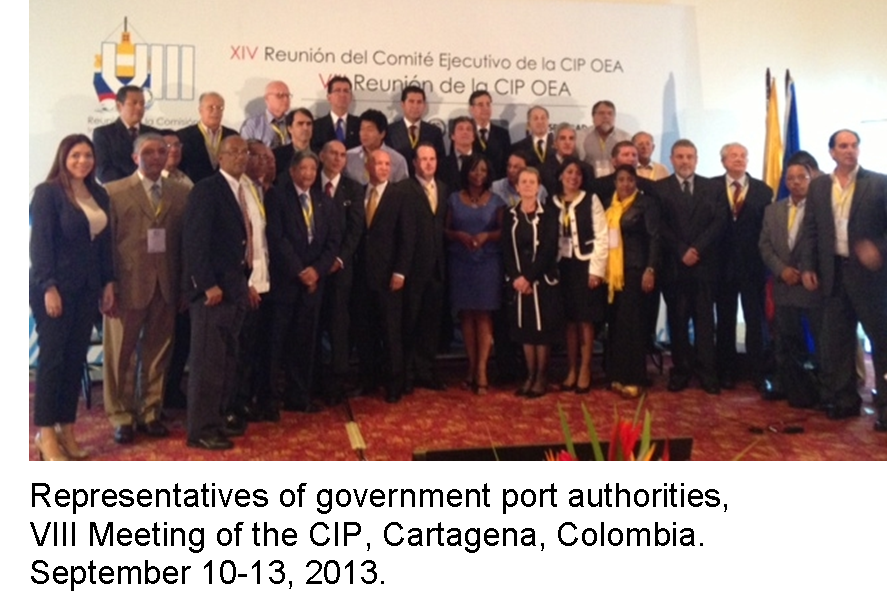Port Authorities of the Americas Define Cooperation Priorities in
Cartagena

Recognizing
the vital role played by ports as part of the critical
infrastructure to improve regional competitiveness, port authorities
from OAS member states gathered at the VIII Meeting of the
Inter-American Committee on Ports
(CIP) from September 10 to 13 in Cartagena de Indias, Colombia.
Sponsored by Colombia’s Superintendency of Ports and Transport and
the OAS-SEDI, the VIII Meeting of the CIP was part of the
Inter-American Forum on Ports, which was supported by the
Inter-American Development Bank (IDB), among other sponsors, and
featured speakers from ECLAC, UNCTAD and the OECD. Authorities and
experts addressed relevant issues such as the potential impact posed
by the expansion of the Panama Canal for the region, as well as port
security and protection, intermodal and logistics networks,
environmental protection and technology integration.
Ports are the main entry and exit point for international trade and
operate as central nodes in the global shipping network. Given that
over 80% of global goods are transported by sea (UNCTAD, 2011) a
modern and efficient port sector capable of responding to the
demands of a globalized world plays a strategic role in improving
the region’s competitiveness.

Considering
the sector’s impact on economic and social development, CIP is part
of the efforts promoted by the OAS-SEDI. The Committee promotes port
development through hemispheric dialogue and cooperation at the
highest levels of government, with the active participation and
collaboration of the private sector.
An example of the ongoing horizontal cooperation promoted by the CIP
is its Technical Advisory Groups (TAGs) mechanism. TAGs are groups
of countries and private sector partners with specific interests and
expertise that provide technical advice to the Committee. Existing
TAGs reflect current priority areas, such as the Logistics,
Innovation and Competitiveness TAG, Chaired by Mexico, and the Port
Protection and Security TAG, Chaired by The United States, among
others.
During the meeting, participating delegations from 18 member states
adopted the
Declaration of Cartagena and the
Action Plan of Cartagena 2014-2015, documents that will guide
the activities of the CIP during that period. The inclusion of the
text proposed by Colombia on money laundering and terrorism in the
port sector highlights an increasing concern for the region. In this
regard, Juan Miguel Duran Prieto, Superintendent of Ports and
Transport of Colombia noted: "We must seek greater transparency in
the port sector in each country to identify possible cases of money
laundering or financing of terrorism. We therefore propose
Colombia’s land freight model to serve as guideline".
For her part, the OAS-SEDI Executive Secretary, Sherry Tross, noted
that "We consider incorporating river and lake ports as part of the
work of the Committee a matter of the greatest importance in
economic terms, as well as for security, environment and social
inclusion". In addition, Jorge Duran, Chief of the CIP Secretariat
affirmed that the documents adopted at the meeting "clearly mark CIP
member countries’ priority areas for the next two years and this
Secretariat will strive to serve its membership."
Looking ahead, the OAS-SEDI, through the CIP, will continue
facilitating productive policy dialogue, technical cooperation and
training in the port sector, while realizing synergies with other
areas of work in the organization such as Trade, Competitiveness,
Tourism, Sustainable Development, Human Development and the
Inter-American Committee on Terrorism (CICTE) in the area of port
security.
The
Inter-American Forum on Successful Experiences was also
organized during the meeting with the support of the Colombian
International Cooperation Agency (APC). The following six
innovative solutions were showcased as experiences that have
succeeded in promoting competitiveness and inclusion in the port
sector:
- Port Expansion Plan (Colombia );
- Logistics Model of the Port of Valparaiso (Chile);
- Development and Port Security (Haiti);
- Quality Monitoring System (Mexico);
- Inclusion of Women in Port Work (Peru), and
- Biological Monitoring Project in four pilot ports (Venezuela).
|
» Back to newsletter

